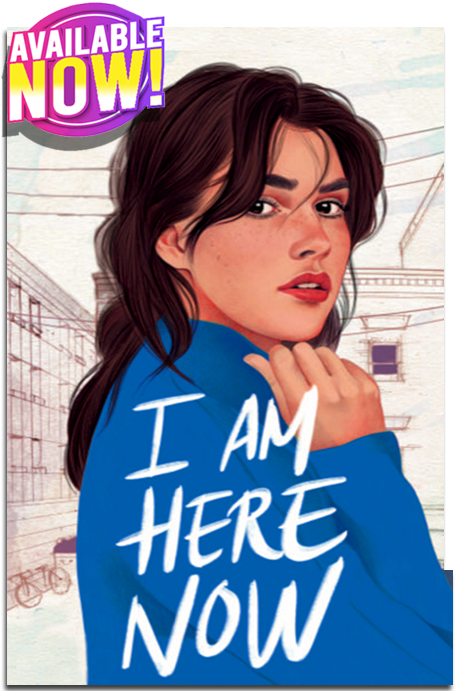
I AM HERE NOW
YOUNG ADULT NOVEL
New York Times Best selling Author Barbara Bottner
A beautiful novel in verse set in the 1960’s about one artist’s coming of age. It’s a heartbreaking, powerful and inspiring depiction of what it’s like to shatter your life―and piece it all back together.
You can’t trust Life to give you decent parents, or beautiful eyes, a fine French accent or an outstanding flair for fashion. No, Life does what it wants. It’s sneaky as a thief. Maisie’s first day of High school should be exciting, but all she wants is to escape. Her world is lonely and chaotic, with an abusive mother and a father who’s rarely there to help. So when Maisie, who finds refuge in her art, meets the spirited Rachel and her mother, a painter, she catches a glimpse of a very different world―one full of life, creativity, and love―and latches on.
But as she discovers her strengths through Rachel’s family, Maisie, increasingly desperate, finds herself risking new friendships, and the very future she’s searching for.
![]()
Star  Review of I Am Here Now
Review of I Am Here Now
I Am Here Now
by Barbara Bottner
High School Imprint/Macmillan – 347 pg.
Fourteen-year-old Maisie characterizes her 1960s coming-of-age in the Bronx as “one of those fairy tales / where the witch eats the child.” And for good reason. Her perfume mogul dad has moved out, leaving Maisie and her little brother to the not-so-tender mercies of their mother Judith, an abusive woman whom Maisie grimly compares to Medea. Maisie copes by immersing herself in art and venting to her neighbor Richie, who is waging his own battle against his father, recently returned from Vietnam.
Maisie finds a kindred spirit in Kiki, her best friend Rachel’s bohemian mother, and blossoms under her kind attention. But when Maisie starts seeing Rachel’s philandering boyfriend on the sly and Rachel finds out, her thin safety net breaks, and she is forced to turn to the one person she swore she would never ask for help — her father. Bottner’s “somewhat biographical but mostly fictional” first-person novel in verse is rife with wrenching domestic and relationship drama. Maisie’s big emotions are splashed messily across every page, much like the Pollock paintings she admires. Her stormy relationship with her mother is heartbreakingly rendered, such as when she raids Judith’s closet: “I’m trying to wear my mother. / It’s the only way I can get close to her.” A detailed author’s note describes what aspects of Bottner’s adolescence inspired the novel.
From the July/August 2020 issue of The Horn Book Magazine.
CLICK TAB BELOW TO OPEN ANOTHER REVIEW:
Kirkus Review
I AM HERE NOW
“Timeless lessons in how to find one’s self-worth in the face of parental abuse”.
ABronx teen comes of age in a dysfunctional family.
Set in 1960, Bottner’s verse novel explores the hardships endured by straight 15-year-old Maisie Meyers and her gay 11-year-old brother, Davy, who are repeatedly subjected to their mother’s violent physical and emotional outbursts and their father’s extended absences. First-person narrator Maisie, from a middle-class Hungarian Jewish American background, takes solace in the friendship of working-class Irish American neighbor Richie O’Neill, the son of a troubled Vietnam veteran prone—like Maisie’s mother—to erratic, abusive behavior. Maisie laments that she and Richie “have parents / who could compete to be / the most unhappily married people / in all of Parkchester” and, given the tense congestion of their urban neighborhood, concludes: “Nobody who lives in the Bronx can relax.” Bottner’s narrative of familial dysfunction probes Maisie’s development as she attempts to protect her brother in a house where “it’s always war” as she acts out, seeking from a boy the affection denied by a mother who “stands firmly against happiness, / as if it’s a bad religion” and who makes no bones about telling her children they were mistakes. Packing numerous themes of evolving teen self-identity amid the cityscape of a broken home, this turbulent, plot-driven tale shows how a miserable home life transcends ethnic, historical, and socio-economic bounds.
Timeless lessons in how to find one’s self-worth in the face of parental abuse. (Verse fiction. 14-18)
Goodreads Review
Set in the 1960s, Barbara Bottner’s I Am Here Now is a beautiful novel in verse about one artist’s coming of age. It’s a heartbreaking, powerful and inspiring depiction of what it’s like to shatter your life―and piece it all back together.
You can’t trust Life to give you decent parents, or beautiful eyes, a fine French accent or an outstanding flair for fashion. No, Life does what it wants. It’s sneaky as a thief.
Maisie’s first day of High school should be exciting, but all she wants is to escape.
Her world is lonely and chaotic, with an abusive mother and a father who’s rarely there to help.
So when Maisie, who finds refuge in her art, meets the spirited Rachel and her mother, a painter, she catches a glimpse of a very different world―one full of life, creativity, and love―and latches on.
But as she discovers her strengths through Rachel’s family, Maisie, increasingly desperate, finds herself risking new friendships, and the very future she’s searching for.
The NERD Daily
Written in verse, Barbara Bottner takes readers back to the sixties where Maisie is figuring out life as a teenager and seeking that love she rarely receives at home. Readers will find themselves taken on a journey of ups and downs and may even learn a thing or two along the way.
With the novel written in this format, it’s a quick read, but it sees our main character Maisie deal with a lot of issues. Her mother, Judith, hardly shows adoration toward her so she leans toward her father more for the love she’s searching for. Her best friend, Ritchie, also faces a similar problem where his dad is abusive. The plot flowed gradually with Maisie meeting Rachel, her profound best friend who in her eyes, lives the ideal life. Rachel’s parents are intimate and her mother, Kiki, is an artist like her. The family welcomes her with open arms and any child who doesn’t receive a great amount of attention at home would adhere to it someplace else.
The writing itself is raw and it will draw in readers of all ages. Readers a bit older than Maisie, like myself, can reflect back on the first experiences she faces. There are many quotes that will probably stick with readers like they did with me! When I noticed that it was written in verse, I though it wouldn’t be as appealing, but I was wrong. Bottner provides enough information for readers to understand Maisie and what she’s going through yet not too much so that we can make our own judgement.
Maisie herself is a complex character and at times readers will feel empathetic, while other times they’ll get frustrated like myself because of the decisions Maisie has made. Yet I reminded myself what Maisie was going through and why she did because of her impulses. There was little character development with her, I’d say I only noticed it towards the end. However, that makes Maisie all the more genuine!
When Rachel gets a boyfriend, Maisie feels a sense of detachment from Rachel. She also becomes jealous at times and wishes for a boyfriend herself. Maisie does make rash decisions that divides her friendship with Rachel and she distances herself from Ritchie who has to fend for himself when his father gets out of control. At one point, Rachel becomes aggravated that Maisie is always at her house for her mother and not her. To Maisie, Kiki was like a second mother or the one she always wanted, yet any friend would become bitter when their best friend only comes over to hang out with their mother and not them.
On to Maisie’s parents who plays a vital role in her life. They’re the cause of most of her irrational decisions. Maisie’s mother doesn’t show much affection to Maisie and I might be wrong but when Maisie is with her father, her mother becomes upset. She always mentions that she’s her father’s favorite and that maybe explains why Judith is keen towards her son, Davy, compared to Maisie. Their parents don’t get along so it isn’t a surprise that the father doesn’t come home a lot, but when he does, Maisie values every moment of it. Although, as the story progresses, she realizes he isn’t as perfect as he appears to be.
Relationships was probably the main theme in this book. Whether it was between parents, friends, sexual, or siblings. For Maisie, all her relationships were tested and some she’d experienced for the first time. She desired love and belonging from others and didn’t stop at anything to achieve them. No matter who got hurt or what she had to do. It really displays what’s important to teenagers at that point in their lives. Bottner played it out so realistically in the end because not everything is rainbows and sunshine.
This novel is bound to take readers on an emotional rollercoaster and makes them reflect on their relationships with others. During this pandemic, it also makes us cherish the small moments we have with loved ones that others can’t have yet crave for. Highly recommend to teenagers, a book worth analyzing in class, so I’d suggest this to your English teachers and also for fans of coming-of-age stories!
I Am Here Now is available from Amazon, Book Depository, and other good book retailers, like your local bookstore.
Link:




